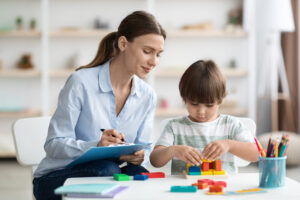What is Child Psychology?
Child psychology is the branch of psychology that focuses on the mental, emotional, and behavioral development of children from infancy through adolescence. It can be particularly challenging as they navigate the transition from childhood to adolescence. They often feel caught between the expectations of maturity and the desire to remain a child. Child psychology addresses the unique mental health challenges that children face during this confusing period and provides the tools necessary to support their emotional well-being.
Common Challenges for Children and Youth
Mental health concerns are widespread among children and youth in Canada, yet less than 20% of the estimated 1.2 million children and youth who experience serious emotional, behavioral, and psychosocial issues receive the treatment they need.
The following challenges can significantly affect a child’s emotional development and behavior.
- Struggling academically or socially
- Experiencing anxiety about school performance or extracurricular activities
- Feeling ostracized or bullied by peers
- Dealing with the loss of a loved one or pet, family separations, or trauma
- Living with developmental disorders like ADHD or autism, or mental health disorders like anxiety and depression
Signs and Symptoms of Mental Health Issues
It is important for parents to be aware of the signs of potential mental health concerns in their children, which may include:
- Emotional changes
- Mood swings, persistent sadness, withdrawal from activities, or overwhelming fears
- Behavioral changes
- Disruptive actions, damaging property, or regressing to younger behavior
- Physical symptoms
- Headaches, stomachaches, trouble sleeping, and self-harm
Treatment Methods
Child therapists are specially trained to help children express their emotions and navigate complex situations. Depending on a child’s individual needs, several treatment methods can be used:
- Art Therapy – Allows children to express feelings through creative outlets like drawing and painting.
- Cognitive Behavioral Therapy (CBT) – Focuses on changing negative thoughts and behaviors to improve emotional regulation.
- Play Therapy – Uses play as a means for children to express their feelings and thoughts in a comfortable environment. Some forms of play therapy can involve sand, figurines, and more.
- Psychotherapy – Helps tweens verbalize their emotions and work through psychiatric or behavioral issues.
- Eye Movement Desensitization and Reprocessing (EMDR) – Particularly effective for trauma, this therapy helps children process traumatic experiences using bilateral stimulation.
Benefits of Child Psychology
- Emotional regulation – Children learn coping mechanisms to handle stress, anxiety, and other negative emotions.
- Improved behavior – Therapy helps children manage disruptive behaviors, improving their school performance and relationships.
- Family support – Parents receive guidance and tools to support their child’s mental health.
- Developmental support – Children with developmental disorders receive the help they need to manage their condition.
What to Expect from Treatment at Spring Integrative Wellness
At Spring, our approach to child psychology is gentle, supportive, and rooted in collaboration. We recognize that every child is unique—and so is every family. That’s why our care is tailored to meet your child’s developmental stage, emotional needs, and family environment.
Our team of child and youth therapists creates a safe, welcoming space where children can explore their thoughts and feelings in ways that feel natural to them—whether that’s through talk, play, art, or movement. We also work closely with parents and caregivers, offering insights, tools, and strategies to support your child’s well-being at home.
At Spring, we’re here to walk alongside you. Together, we’ll nurture your child’s resilience and support their growth—emotionally, socially, and developmentally.







